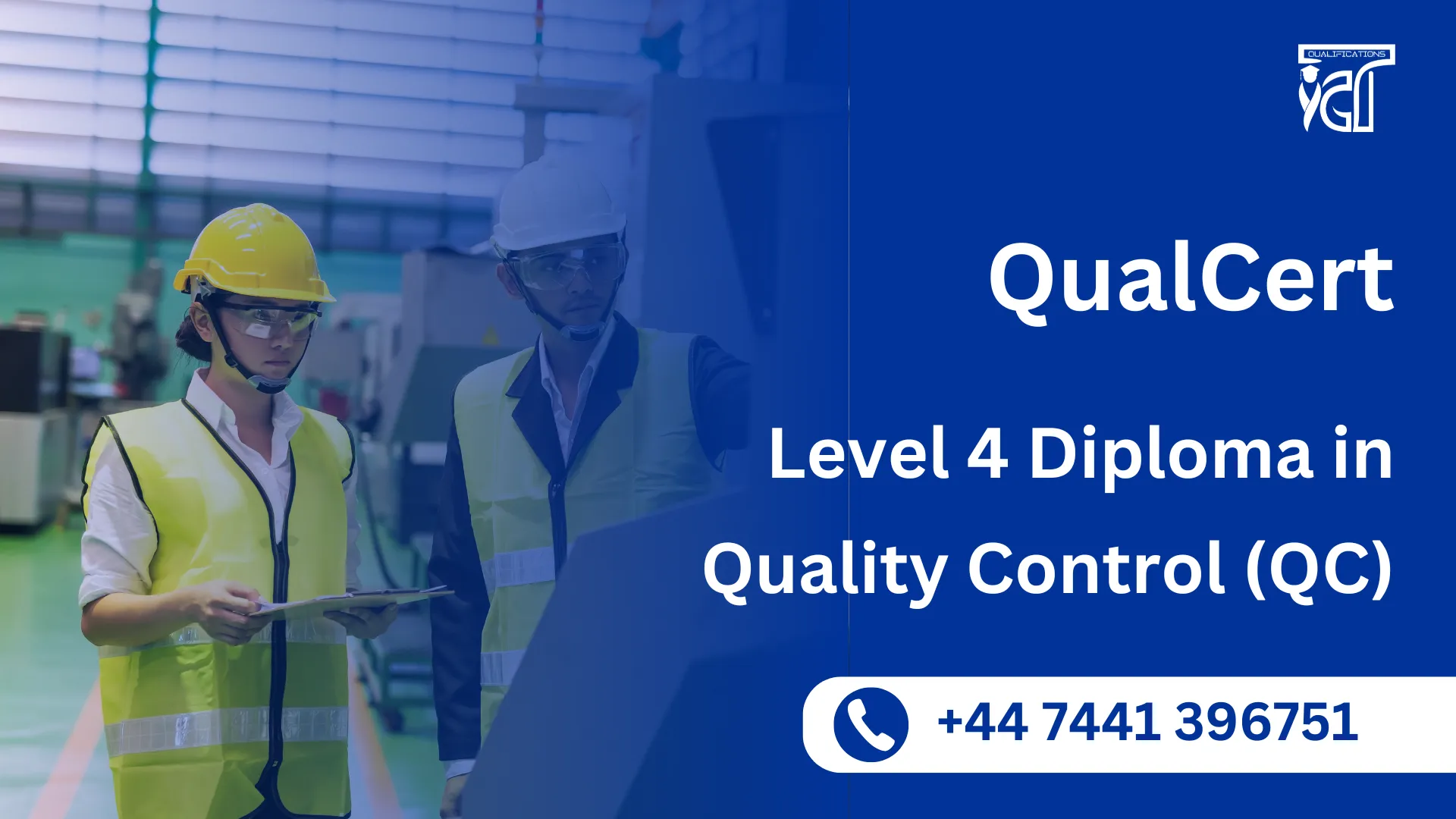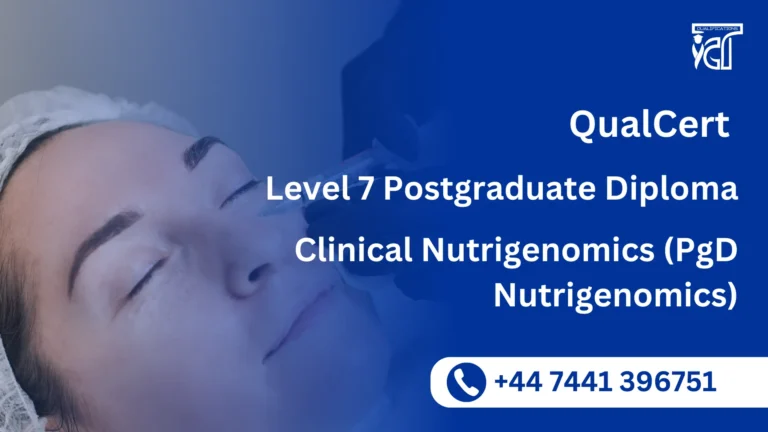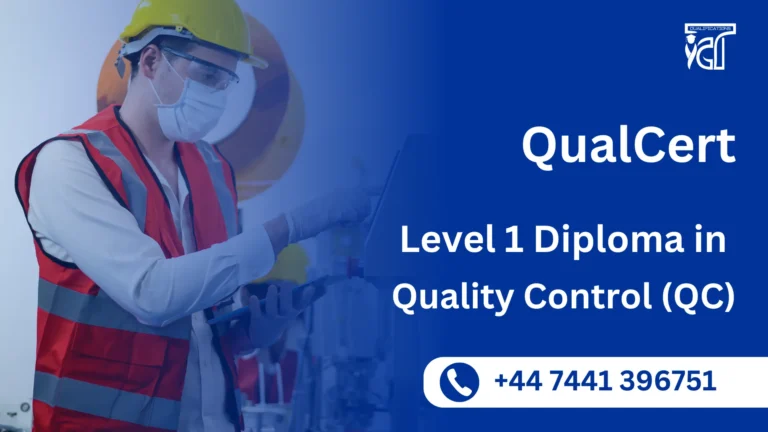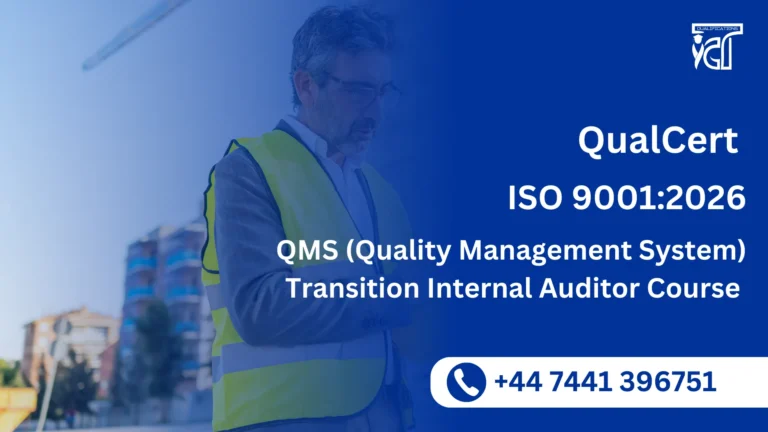In today’s competitive business landscape, maintaining product and process quality is vital to operational success and customer satisfaction. Whether in manufacturing, logistics, healthcare, or engineering, the need for skilled Quality Control (QC) professionals is growing rapidly. The QualCert Level 4 Diploma in Quality Control (QC) offers a robust, Ofqual-regulated qualification designed to equip learners with the core competencies and practical knowledge needed to excel in quality control roles across various industries.
This diploma serves as the ideal starting point for those seeking to establish a career in quality assurance or enhance their skills in maintaining and monitoring quality systems in a professional environment.
The QualCert Level 4 Diploma in Quality Control (QC) is a comprehensive qualification that covers essential quality assurance principles, inspection techniques, compliance standards, and documentation processes. This course is fully assignment-based, allowing learners to apply theory directly to workplace scenarios without the pressure of final exams.
Delivered via flexible online learning, the course is suitable for full-time professionals, career changers, and individuals entering the quality control field. With expert tutor support and practical assignments, learners will gain a solid foundation to work confidently in quality-driven environments.
The QualCert Level 4 Diploma in Quality Control (QC) is more than just a qualification—it’s a career-building investment for professionals committed to excellence in product, service, and process quality. With a flexible, assignment-based structure and globally recognized accreditation, this diploma sets the foundation for long-term success in the quality assurance field.
Take the first step in your QC career today—enroll in the QualCert Level 4 Diploma and unlock your potential in quality control.
QualCert Level 4 Diploma in Quality Control (QC)
This QualCert Level 4 Diploma in Quality Control (QC) course offers 50 Credits, requiring a Total Qualification Time (TQT) of 500 hours, including 250 Guided Learning Hours (GLH). It is designed for efficient and focused skill development in Quality Control (QC).
| Unit Ref# | Unit Title | Credit | GLH | TQT |
| QC01010 – 1 | Advanced Structural Quality Control | 8 | 40 | 80 |
| QC01010 – 2 | Non-Destructive Testing (NDT) Techniques | 8 | 40 | 80 |
| QC01010 – 3 | Quality Control for Large-Scale Projects | 8 | 40 | 80 |
| QC01010 – 4 | Advanced Material Testing and Analysis | 8 | 40 | 80 |
| QC01010 – 5 | Management of Quality in Construction Projects | 9 | 45 | 90 |
| QC01010 – 6 | Legal and Ethical Issues in QC Practices | 9 | 45 | 90 |
GLH (Guided Learning Hours) and TQT (Total Qualification Time) are terms commonly used in vocational qualifications to help define the amount of time a learner is expected to spend on their studies.
1. GLH (Guided Learning Hours)
GLH refers to the number of hours a learner spends being directly taught, supervised, or supported during their course. This includes the time spent in activities such as:
- Classroom instruction
- Practical workshops
- One-on-one tutoring or mentoring sessions
- Online learning sessions with tutor support
In other words, GLH represents the time that learners are actively engaged with their instructors or learning activities.
2. TQT (Total Qualification Time)
TQT represents the total amount of time a learner is expected to invest in completing a qualification, including:
- GLH (Guided Learning Hours): Time spent on direct learning, as explained above.
- Self-Directed Learning: This includes time spent on independent study, research, assignment completion, preparation for exams, and any other work the learner does outside of direct teaching hours.
TQT is a broader measure that includes all the time required to achieve the qualification. It helps learners and employers understand the overall commitment required for the qualification.
Key Differences Between GLH and TQT:
- GLH focuses on direct learning with guidance or supervision.
- TQT includes GLH as well as independent study time and other learning-related activities.
Example:
If a qualification has a TQT of 600 hours and a GLH of 250 hours, it means the learner should spend 250 hours in direct learning (classroom, online, or tutor-led sessions) and 350 hours on independent study or research.
Upon successful completion of the Level 4 Diploma in Quality Control, students will be able to:
- Advanced Structural Quality Control
- Develop expertise in advanced techniques for structural quality control, ensuring the integrity and safety of various structural elements.
- Understand the application of quality control systems in structural design and construction to minimize defects and ensure compliance with industry standards.
- Gain the ability to assess and mitigate risks related to structural quality in complex construction projects.
- Master the use of advanced tools and technologies for monitoring and testing structural quality throughout the construction phase.
- Non-Destructive Testing (NDT) Techniques
- Learn the principles and applications of non-destructive testing methods, including ultrasonic, radiographic, and eddy current testing, to evaluate material properties without causing damage.
- Gain proficiency in selecting appropriate NDT methods for different materials and applications.
- Understand the limitations and capabilities of various NDT techniques for detecting structural flaws, cracks, and other hidden defects.
- Develop the ability to analyse and interpret NDT results to inform decision-making and ensure quality control in construction and manufacturing environments.
- Quality Control for Large-Scale Projects
- Learn the principles and strategies for managing quality control in large-scale construction or manufacturing projects.
- Develop skills in planning, monitoring, and controlling quality throughout the lifecycle of large projects to ensure consistency and meet client expectations.
- Understand the importance of project-specific quality standards, schedules, and resource management in maintaining quality over the duration of large-scale projects.
- Gain the ability to manage multiple teams, subcontractors, and suppliers while maintaining high-quality standards and minimizing risks.
- Advanced Material Testing and Analysis
- Gain a deep understanding of advanced material testing methods used to evaluate the strength, durability, and performance of materials in construction and industrial applications.
- Learn how to conduct comprehensive tests on a wide range of materials, including metals, polymers, and composites, and analyse the results to assess their suitability for specific uses.
- Develop the ability to interpret complex material test data and make informed decisions about material selection and quality.
- Acquire knowledge in the latest advancements in material testing technologies and their applications in enhancing product quality and performance.
- Management of Quality in Construction Projects
- Master the principles of quality management in construction, including the creation and implementation of quality assurance plans and procedures.
- Learn how to establish quality benchmarks, monitor performance, and ensure continuous quality improvement throughout the construction process.
- Develop the ability to manage quality control teams, coordinate between stakeholders, and ensure compliance with regulatory and contractual requirements.
- Gain skills in managing quality audits, inspections, and documentation to ensure the successful completion of construction projects that meet both client and industry standards.
- Legal and Ethical Issues in QC Practices
- Understand the legal and ethical considerations involved in quality control practices, including compliance with regulatory standards and industry codes of conduct.
- Develop the ability to identify and address ethical dilemmas that may arise in quality control processes and decision-making.
- Learn about the consequences of non-compliance with legal standards and how to mitigate risks through adherence to established quality control regulations.
- Gain a comprehensive understanding of contractual obligations and the importance of maintaining ethical standards in client relationships and quality management practices.
Benefits of the QualCert Level 4 Diploma in Quality Control (QC)
The QualCert Level 4 Diploma in Quality Control (QC) provides foundational yet career-enhancing knowledge for those aiming to establish or advance in the field of quality assurance. As an Ofqual-regulated and globally recognized qualification, it offers a range of practical and professional benefits:
1. Ofqual-Regulated and Internationally Recognized
This qualification is approved by Ofqual, the UK’s official regulatory body, ensuring it meets high standards and is accepted by employers and institutions worldwide.
2. 100% Assignment-Based – No Exams
Learners are assessed entirely through practical assignments. This hands-on approach allows for better application of skills in real-world settings and avoids the pressure of formal exams.
3. Flexible Online Learning
The course is delivered entirely online, making it accessible for working professionals, part-time learners, and international students. Study at your own pace, anytime, anywhere.
4. Strong Foundation in Quality Principles
Gain essential knowledge in areas such as inspection processes, quality documentation, compliance, and non-conformance handling—skills applicable across multiple sectors.
5. Improves Employability and Job Readiness
This diploma opens doors to entry- and mid-level roles in quality control and assurance, including:
- QC Technician
- Quality Inspector
- Compliance Assistant
- Production Quality Operator
6. Applicable Across Multiple Industries
Whether you work in manufacturing, engineering, pharmaceuticals, logistics, or food production, the knowledge gained is relevant and adaptable.
7. Prepares You for Further Progression
It creates a pathway to advanced certifications, including:
- QualCert Level 5 and Level 6 Diplomas
- Lean Six Sigma certifications
- ISO Internal Auditor training
8. Boosts On-the-Job Performance
Apply best practices in real time—enhancing process quality, reducing waste, and ensuring customer satisfaction.
9. Enhances Communication and Team Collaboration Skills
Quality control isn’t just technical—it involves teamwork. This course helps improve your ability to collaborate and communicate in quality-focused environments.
10. Professional Recognition
Earning this diploma demonstrates your commitment to quality and professional growth, setting you apart in today’s competitive job market.
By choosing the QualCert Level 4 Diploma in Quality Control (QC), you’re laying a strong foundation for a successful, quality-focused career path. Let me know if you’d like this formatted for a brochure or website page!
The Level 4 Diploma in Quality Control (QC) is designed for a diverse range of individuals who are interested in developing their skills and advancing their careers in the field of quality control. This course is particularly suited for:
1. Aspiring Quality Control Professionals
- New Graduates: Individuals who have recently completed their secondary education or an equivalent qualification and are looking to start a career in quality control.
- Career Switchers: Professionals from other fields who wish to transition into a quality control role and need formal training and certification to do so.
2. Existing Quality Control Practitioners
- Quality Control Technicians: Individuals currently working in entry-level QC positions who want to enhance their knowledge and skills to take on more advanced roles.
- Quality Assurance Officers: QA professionals seeking to deepen their understanding of QC methodologies and tools to complement their existing expertise.
3. Mid-Level Managers and Supervisors
- Production Managers: Managers overseeing manufacturing or production processes who need to implement and maintain quality control systems.
- Team Leaders: Supervisors responsible for ensuring that their teams adhere to quality standards and protocols.
4. Industry Professionals
- Manufacturing Sector: Individuals working in manufacturing industries where quality control is critical to product integrity and customer satisfaction.
- Pharmaceutical and Healthcare Sectors: Professionals in sectors where stringent quality standards are mandatory to ensure safety and compliance.
- Food and Beverage Industry: Quality control personnel in the food industry who need to ensure products meet health and safety standards.
5. Entrepreneurs and Business Owners
- Small Business Owners: Entrepreneurs running small to medium-sized enterprises who want to implement robust quality control measures to improve product quality and customer satisfaction.
- Start-Up Founders: Individuals in start-ups, especially in production or manufacturing, who need a foundational understanding of quality control to build their business on solid quality principles.
6. Regulatory and Compliance Personnel
- Compliance Officers: Professionals responsible for ensuring that their organizations comply with industry regulations and standards.
- Regulatory Affairs Specialists: Individuals tasked with navigating and implementing regulatory requirements related to quality control.
7. Continuous Improvement Enthusiasts
- Lean and Six Sigma Practitioners: Individuals trained in Lean and Six Sigma methodologies who want to expand their knowledge in quality control to enhance process improvement initiatives.
- Continuous Improvement Managers: Professionals dedicated to fostering a culture of continuous improvement within their organizations.
8. Academic and Training Institutions
- Educators and Trainers: Individuals teaching quality control courses who seek formal qualifications to enhance their teaching credentials.
Entry Requirements
Register Now
Qualification Process
Qualification Process for the QualCert Level 4 Diploma in Quality Control (QC)
- Self-Assessment:
Begin by evaluating your eligibility to ensure you meet the qualification requirements, including work experience, knowledge, and language proficiency. - Registration:
Complete your registration by submitting the required documents, including a scanned copy of a valid ID, and paying the registration fee. - Induction:
An assessor will conduct an induction to confirm your eligibility for the course and explain the evidence requirements. If you do not meet the criteria, your registration will be canceled, and the fee will be refunded. - Assignmnets & Evidence Submission:
Provide all assignmnets and the necessary evidence based on the assessment criteria outlined in the course. If you are unsure of the required evidence, consult with the assessor for guidance on the type and nature of evidence needed. - Feedback and Revision:
The assessor will review your submitted evidence and provide feedback. Evidence that meets the criteria will be marked as “Criteria Met,” while any gaps will be identified. You will be asked to revise and resubmit if needed. - Competence Evidence:
Submit final evidence demonstrating that all learning outcomes have been met. This evidence will be marked as “Criteria Met” by the assessor once it is satisfactory. - Internal Quality Assurance (IQA):
The Internal Quality Assurance Verifier (IQA) will review your evidence to ensure consistency, quality, and compliance with standards. - External Verification:
The IQA will submit your portfolio to QualCert External Quality Assurance Verifiers (EQA) for final confirmation. The EQA may contact you directly to verify the authenticity of your evidence. - Certification:
Upon successful completion of all checks, QualCert will issue your official certificate, confirming that you have attained the QualCert Level 4 Diploma in Quality Control (QC).







